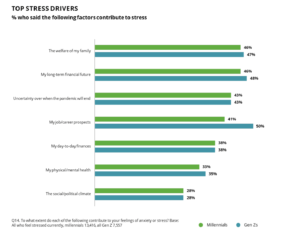
In many ways, Gen Z has replaced millennials as everyone’s favourite punching bag. You’ve probably heard the stereotypes: they’re addicted to social media, they don’t work hard and they have high expectations for work-life balance despite being new to the workforce.
As the youngest cohort to enter the workforce, Gen Z can be difficult to figure out if you’re a hiring manager or team leader. What exactly drives Gen Z in the workplace? What are their goals? What pain points do they share?
What does generation Z mean?
Born between 1995 and 2012, Generation Z — also colloquially known as “zoomers” — refers to the cohort of people reaching adulthood in the second decade of the 21st century. The “Z” comes from the fact they’re the generation after Generation Y (a.k.a. millennials), who, in turn, follow Generation X.
According to the World Economic Forum, Gen Z will make up 27% of the workforce in OECD countries by 2025, making it important for employers to prepare for their specific needs and characteristics. For instance, Bloomberg reports that 91% of Gen Z workers are drawn to employers that use sophisticated technology in the workplace and 77% want companies that value diversity.
Because many Gen Z workers are new to the workplace, it’s easy for employers to make the mistake of assuming that certain stereotypes apply to everyone in this generation. In this guide, we correct 10 misconceptions about Gen Z in the workplace (spoiler alert: they’re more like previous generations than you think).
1. Gen Z don’t understand the challenges and aspirations of previous generations
The truth is Gen Z workers are far more similar to their millennial counterparts than they are different. Writing for The Guardian, Maddy Thomas explains, “Despite the stereotypes, my generation also wants a house, a family and a career — we just worry they might be unattainable.”
And like millennials, Gen Z struggles with anxiety and stress more than older generations and understands the importance of mental health benefits and maintaining a healthy work-life balance. In fact, a 2021 Deloitte Global Talent study shows millennials and Gen Z experience equal levels of stress about the same issues.
Source: Deloitte
Related Reading: Should Your Employees Be Working 4 Days a Week?
2. They’re all digital natives
While it’s true that most Gen Z-ers have grown up with technology, not all of them are “digital natives.” In fact, research by Dell Technologies shows only 52% of Gen Z students said they are confident they have the technology skills employers want. Even more concerning is how a study by Koenig Solutions found less than 17% of Gen Z-ers feel more confident using office-based software — a pillar of workplace productivity — than social media.
3. Gen Z are entitled
This is one of the most common misconceptions about Gen Z in the workplace, but it’s simply not true. In reality, Gen Z-ers are incredibly hardworking and motivated, with a strong desire to make an impact in their careers. In fact, they’re often more driven than their Millennial counterparts, thanks in part to the challenges they’ve faced growing up during the Great Recession.
For instance, a Monster study found that 58 % of Gen Z workers were willing to work weekends and nights in exchange for a higher salary. They’re even willing to uproot their lives; 67% of GenZ job seekers said they’d be willing to relocate for work.
4. Gen Z hate the office
Another common misconception about Generation Z in the workplace is that they’re all in on remote working. Cloudbooking’s The Future of Work: 8 Trends in Workplace Transformation report shows Gen workers are more likely to have a negative view of working only from home. When asked to identify their ideal working environment, only 11% of Gen Z selected full-time working from home — the lowest among our five surveyed age groups we surveyed.
What Gen Z want is the best of both worlds — hybrid working or the ability to choose when and where to work, whether it’s the office or from any remote location.
5. They’re not interested in long-term careers
Gen Z workers are often assumed to be uninterested in pursuing long-term careers, but this is simply not true. In reality, Gen Z-ers are just as interested in finding stability and building successful careers as their predecessors. The only difference is they’re more likely to change jobs in order to do so.
According to the Deloitte Global 2022 Gen Z and Millennial Survey, loyalty to employers among Gen Z and millennials is largely driven by work-life balance, pay and career development opportunities.
6. They don’t care about company culture
This couldn’t be further from the truth. In reality, Gen Z-ers place a high value on company culture and values and are more likely than any other generation to consider it when making job decisions.
<cta>Related Reading: How to Enhance Workplace Culture in a Post-Covid Hybrid Environment
Case in point: 37% and 46% of Gen Z workers and Gen Z-ers in senior positions, respectively, said they had rejected a job based on their personal ethics, according to Deloitte. They also care about pressing issues like climate change; 48% of Gen Z said they’d pressured their employers to take action to address it.
Related Reading: 10 Ways to Reduce Your Carbon Footprint at the Office
7. They’re not team players
Gen Z workers are often assumed to be lone wolves who prefer to work independently, but this is not the case. In reality, Gen Z-ers are highly collaborative and value teamwork. In fact, studies have found they’re more likely than any other generation to seek out opportunities to work on teams.
Our research on hybrid working shows that 41% of 18 to 24-year-old workers agree that working from home was difficult because of home life pressures — nearly double the rate of 45 to 54-year-old workers.
Related Reading: The Hybrid Working Model: What Is It and Can It Work?
This gap is perhaps due to young workers’ lack of experience working remotely and their frustration over the loss of community and networking opportunities in the office. According to a poll of college students and recent graduates by Generation Lab, 74% of respondents said they’re concerned about losing a sense of community in remote work setups, while 41% pointed to a lack of mentorship opportunities.
8. They’re not receptive to feedback
Another common misconception about Gen Z workers is they’re not receptive to feedback. But the truth is, Gen Z-ers actually crave feedback in order to improve their performance. In fact, research has found they actively seek out regular feedback from their superiors.
INC reports that 66% of Gen Z said they want feedback from their immediate supervisor at least every few weeks to stay at their jobs. In contrast, less than half of millennials required the same level or frequency of feedback.
9. They’re not leadership material
Gen Z workers are highly ambitious and eager to take on leadership roles. In fact, research has found they’re more likely than any other generation to aspire to leadership positions, the lack of which has a major impact on their loyalty.
According to a LinkedIn report, Gen Z employees with plans to leave their current jobs have the clearest job-seeking objectives of any generational cohort:
- 61% said they want to seek opportunities to move up the ladder or increase their responsibilities.
- 76% said they want opportunities to learn or practice new skills.
10. It’s not worth investing in Gen Z in the workplace
This is one of the most dangerous misconceptions about Gen Z workers because it leads employers to believe they don’t need to invest in this rising generation of talent. But the truth is, Gen Z-ers are absolutely worth the investment. The Pew Research Center notes Gen Z-ers are on track to be the most well-educated generation ever (a distinction currently held by millennials), making them an important source of talent and ideas in the workplaces of the future.
Related Reading: The Future of Working from Home: Hybrid Office or Remote Work?
Don’t underestimate the importance of Gen Z in the workplace
Don’t let these misconceptions about Generation Z in the workplace stop you from investing in this rising generation of talent. They’re hardworking, motivated, and eager to make a difference in their careers. With the right opportunities, they have the potential to be your company’s next leaders.
Find more insights on ethical practices in the workplace by going through the Cloudbooking blog. If you need a cloud-based solution to enable seamless collaboration and communication between your hybrid teams, Cloudbooking’s desk booking and meeting room booking solutions are what you need. Contact our team to schedule an obligation-free demo.



